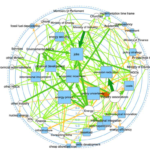This paper analyses why middle-income countries incentivize renewable energy despite inexpensive domestic fossil fuel resources and lack of international support. We examine the politics of renewable energy programs in Mexico, South Africa and Thailand. All three countries hold abundant local fossil fuel and renewable energy resources. We argue that renewable energy programs become implementable policy options in fossil fuel resource-rich middle-income countries when coalitions of powerful political actors support them.
This study presents an analysis of the domestic coalitions in support of and those in opposition to renewable energy policies from a discourse network perspective. Discourse networks reflect actors and the arguments they share to advance or hamper the policy process.
The analysis draws on a data set of 560 coded statements in support or opposition of renewable energy from media articles, policy documents and interviews. Findings show similar structures of competing coalitions in all three countries, with the discourse in all three countries revealing strong linkages between environmental and economic considerations.
- Rennkamp, Britta/Haunss, Sebastian/Wongsa, Kridtiyaporn/Ortega, Araceli/Casamadrid, Erika (2017), »Competing coalitions: The politics of renewable energy and fossil fuels in Mexico, South Africa and Thailand«, Energy Research & Social Science, 34, S. 214–223.

